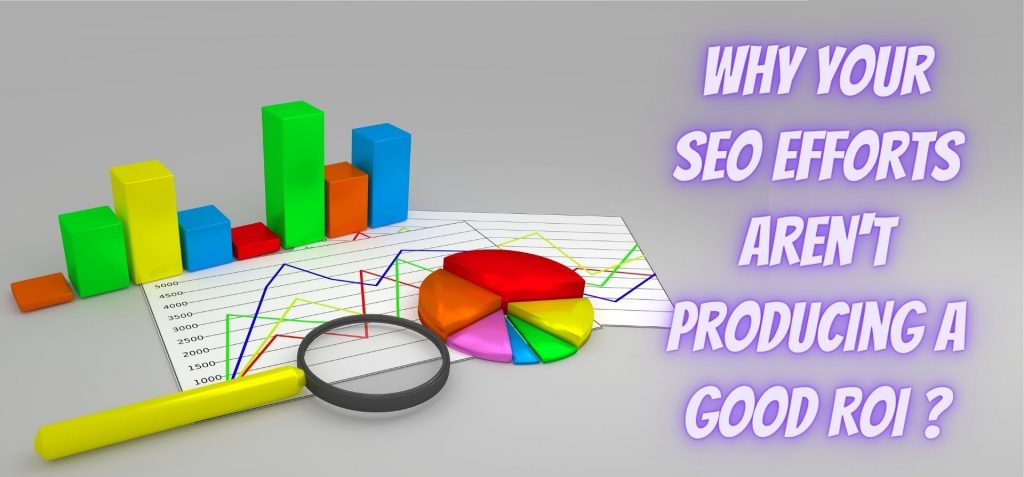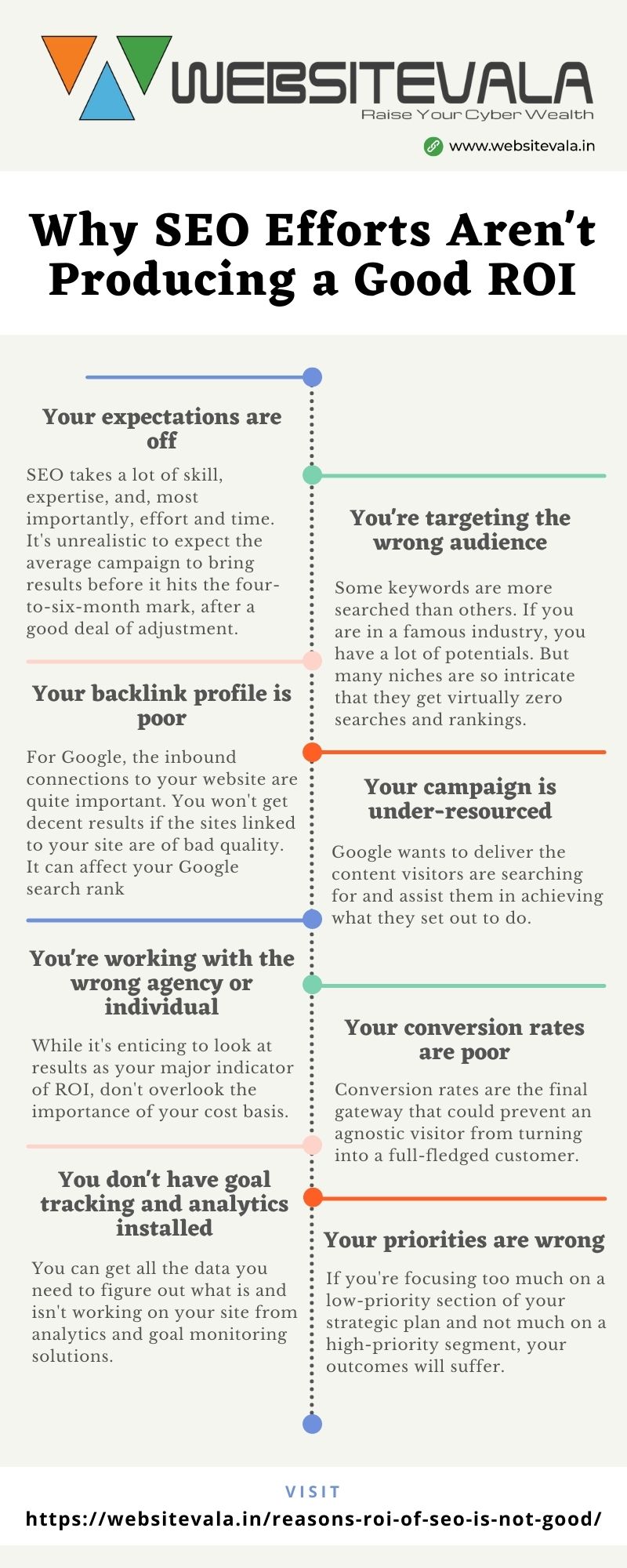Jump Directly to the Topic of Your Interest
Toggle- What is ROI meaning in SEO
- How to calculate SEO ROI
- What is a good SEO ROI?
- Why you’re not getting the most out of your SEO campaigns?
- 1. You’re targeting the wrong audience
- 2. Your expectations are off
- 3. Your campaign is under-resourced
- 4. Your backlink profile is poor
- 5. You’re working with the wrong agency or individual
- 6. Your conversion rates are poor
- 7. Your priorities are wrong
- 8. You don’t have goal tracking and analytics installed
- Final thoughts
- Infographic
Search engine optimization is a smart buy for most businesses because, when done properly and well, it will assist in bringing in a steady stream of leads that convert customers.
It works for you around the clock, unlike PPC advertising, which stops functioning when you stop paying for it. But, plenty of SEO efforts aren’t what you predict them to be – and if your SEO doesn’t work, there are numerous reasons why that could be the case.
Let’s take a closer look at the top most likely causes you’re not getting the most out of your SEO campaigns.
What is ROI meaning in SEO
Return on Investment (ROI) is one of the most popular performance indicators monitored by companies. It’s used to determine the connection between the budget spent on a strategic plan and what you get back as practical results in expansion and awareness.
The same rule applies to SEO ROI. It is the relationship between the amount you spend on SEO tactics and resources and the results you get from that spend. When implemented properly, an SEO strategy can increase organic traffic, put more content on the top of search results pages, increase user sessions, and boost user engagement.
When you start any SEO campaign, ensure that you conduct a detailed competitive analysis to know what you’re up against. This will assist you in developing the best strategy for your budget and objectives, which will also help establish reasonable expectations.
How to calculate SEO ROI
Use the following formula to determine the ROI of SEO:
(Gain from Investment – Cost of Investment) / Cost of Investment
Determine your expenses for investing in SEO to get your “Cost of Investment,” and then reference your Google Analytics figures to get your “Gain from Investment.” Substitute your figures in the formula and get your ROI from SEO.
What is a good SEO ROI?
An effective Seo ROI depends on your business. It is challenging to determine an average or decent SEO ROI because every business is unique. While one company spends £1500 per month on SEO, another dedicates £3000. Not to mention, lead values differ from company to company.
Before optimizing your website for SEO, consider devising an ideal ROI for your company. This figure can be a benchmark for your group or agency to measure against itself. For optimal outcomes, begin with a small percentage and then work towards a bigger one as you gain data.
Comparing SEO to other marketing channels is another method for calculating the ROI for SEO. If the percentage indicates a better or comparable estimate to paid search, digital advertising, or social media marketing, for instance, that is a good indicator of SEO’s effectiveness.
Why you’re not getting the most out of your SEO campaigns?
In your SEO campaign, if you’re currently facing a negative or neutral ROI, take a look at these 8 mistakes and scenarios which is causing it to fall down.
1. You’re targeting the wrong audience
Some keywords are more searched than others. If you are in a famous industry, you have a lot of potentials. But many niches are so intricate that they get virtually zero searches and rankings.
It won’t matter how famous you are under those search terms if no one is looking. If you don’t dive deeper into who your client is and how they find solutions to problems, you’ll miss useful channels for reaching out to them.
2. Your expectations are off
SEO takes a lot of skill, expertise, and, most importantly, effort and time. It’s unrealistic to expect the average campaign to bring results before it hits the four-to-six-month mark, after a good deal of adjustment.
The actual effect doesn’t begin until well into the second month. Usually, it isn’t until the sixth month, when the changes are in place, and Google has had a chance to record them, that you should try to figure out how successful the campaign was. Measuring earlier than that could skew the results, and they might even be inaccurate.
3. Your campaign is under-resourced
Google wants to deliver the content visitors are searching for and assist them in achieving what they set out to do.
Some questions are for information, others are for navigation, and others are transactional. You must recognize the intent behind the keywords for which individuals are looking and use that intent to structure your content.
Blogging daily is worthless if you don’t give your readers something of value! Additionally, you must properly write your article in terms of grammar and spelling. You’ll struggle to achieve any search-engine rank if you have too much content that isn’t relevant or well-written.
4. Your backlink profile is poor
For Google, the inbound connections to your website are quite important. You won’t get decent results if the sites linked to your site are of bad quality. It can affect your Google search rank if your backlink profile is completely ‘spammy’ or unimportant sites; too much can receive a penalty, temporarily removing your site from the organic search results.
5. You’re working with the wrong agency or individual
While it’s enticing to look at results as your major indicator of ROI, don’t overlook the importance of your cost basis. Even excellent inbound traffic results won’t be able to guarantee a profitable outcome for your campaign if you’re paying too much for SEO.
Be sensible in your investment decisions; you can recruit an agency or a full-time expert or work with freelancers to plan and carry out your campaign. Each has benefits and drawbacks.
6. Your conversion rates are poor
Conversion rates are the final gateway that could prevent an agnostic visitor from turning into a full-fledged customer. You might receive thousands of visitors from search engine results pages, but if your conversion rate is low, none of that traffic will translate into relevant revenue. Optimize your website for conversions with precise, convincing copy; simple, visible calls to action; and trust signals.
7. Your priorities are wrong
There are many primary focuses for an SEO campaign—ensuring onsite optimization, generating regular content, establishing inbound links, and interacting socially are just a few of them.
If you’re focusing too much on a low-priority section of your strategic plan (like uploading news updates on social media) and not much on a high-priority segment (like defining connections with relevant publishers in your niche), your outcomes will suffer.
8. You don’t have goal tracking and analytics installed
If you haven’t thought about setting up website analytics, how can you be amazed that your SEO campaign is failing? You can get all the data you need to figure out what is and isn’t working on your site from analytics and goal monitoring solutions.
Operating without this knowledge is similar to driving a car without a rearview mirror; you won’t understand why your campaign isn’t succeeding unless you look back and discover how previous decisions have impacted your current performance!
So ensure that you are reaping the benefits of your Google Analytics account. You can also discover advanced settings and other exciting tools to help your business flourish once you feel comfortable using them.
Final thoughts
Evaluating SEO’s return on investment puts the effect of SEO into perspective. You can show business decision-makers how SEO has produced traffic, leads, and sales, for instance, which can result in continued investment in this strategic plan.
There’s no way to determine when your SEO actions will pay off, so patience is a quality all SEOers must possess. Even if you don’t see outcomes in the expected timeframe, keep trying; sooner or later, your results will be rewarded.
So what are you waiting for? If your ROI of SEO is not good enough or even negative Contact us at +91-8866860847 or info@websitevala.in. We have proven strategies for how to improve the ROI of SEO.
Infographic
(Click on Infographic to enlarge)

MohammedTahir Patel is a Website Developer and Digital Marketing Consultant with 8+ years of experience in SEO, Local SEO, and online growth strategies. He specializes in building SEO-friendly WordPress websites, managing digital marketing campaigns, and helping small businesses grow their online presence. Passionate about technology and automation, MohammedTahir combines creativity with technical expertise to deliver results that matter.







